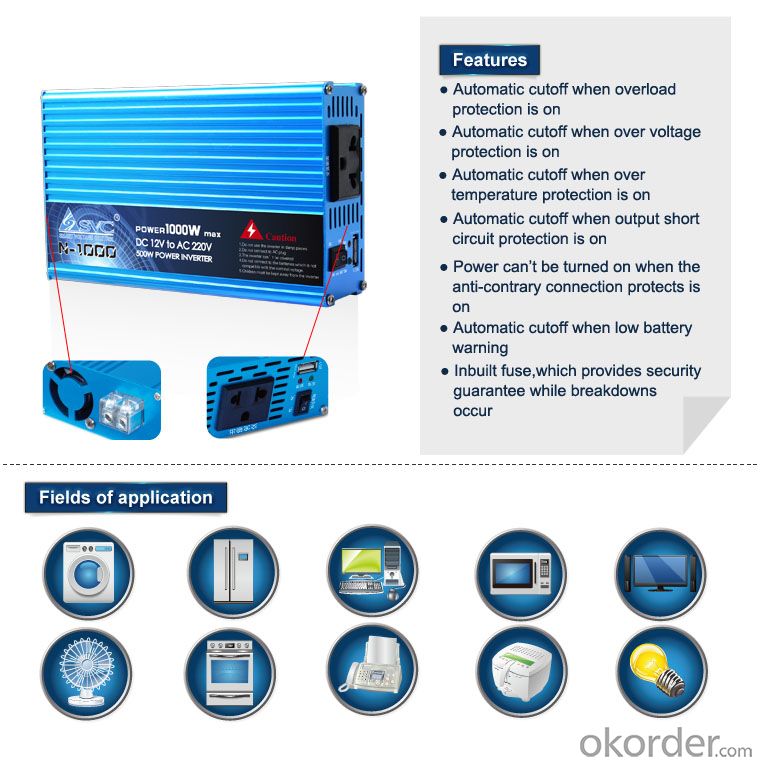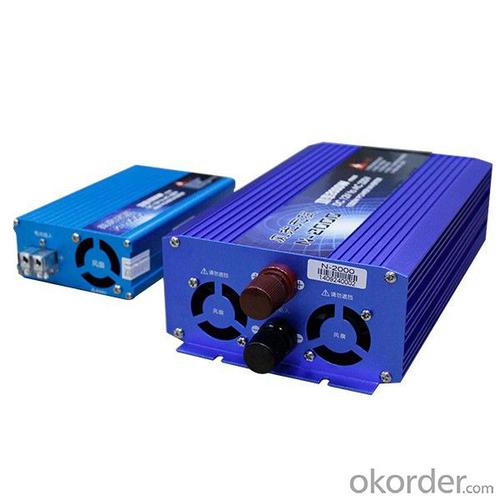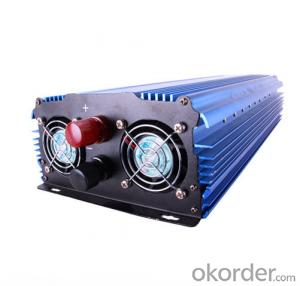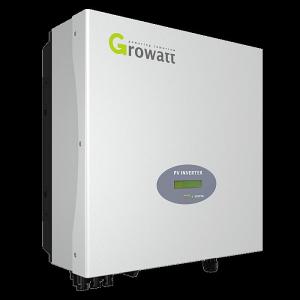Marine Solar Energy Systems Compatible Car Inverter / Home Appliance Reasonable Design Car Inverter 12V 220V
- Loading Port:
- China main port
- Payment Terms:
- TT OR LC
- Min Order Qty:
- 20 carton
- Supply Capability:
- 10000 carton/month
OKorder Service Pledge
OKorder Financial Service
You Might Also Like
Home Appliance Reasonable Design car inverter 12v 220v

Product introduction
ART-P series, PWM wave and rated power from 300w to 3000w, designed to meet different requirements in the middle market. Power supply by converting DC 12V/24V/48V (for example, batteries of cars, ships and accumulator etc.) to AC 115V/230V, and suitable for electrical equipment less than 3000W (e.g. cellphone, laptop, and solar power system etc.)

| Model | ART-P300 | ART-P500 | ART-P1000 | ART-P2000 | ART-P3000 |
| Rated power | 300W | 500W | 1000W | 2000W | 3000W |
| Max power | 600W | 1000W | 2000W | 4000W | 6000W |
| INPUT | |||||
| Input voltage | 12V/24/48VDc | ||||
| OUTPUT | |||||
| Output voltage | 115V/230VAc(1±5%) | ||||
| Output wave form | PWM | ||||
| Output frequency | 50/60Hz | ||||
| FUNCTION | |||||
| USB Port | 5V 500mA(optional) | ||||
| No-load current | <0.5a< span=""> | ||||
| Efficiency | >90% | ||||
| PROTECTION | |||||
| Protections | overload protection, input overvoltage protection, input under-voltage protection, over temperature protection, Buzzer protection and Intelligent control. | ||||
| PHYSICAL | |||||
| Unit dimension (mm) | 120*100*50mm | 165*100*50mm | 240*155*70mm | ||
| Unit weight (kg) | 0.45(Kg) | 0.60(Kg) | 0.65(Kg) | 1.2(Kg) | 1.42(Kg) |
| Packing details | Color box(20pcs/ctn) | Color box(12pcs/ctn) | |||
| ENVIRONMENT | |||||
| Environment of performance | Temperature 0℃~40℃, Humidity 20%~90% | ||||
| Noise level | Less than 40dB | ||||

Feature
1. Design of aluminum case ensures its excellent cooling abllity and sturdiness, also extending service life.
2. Car cigarette lighter wire and clip wire (optional) for using in car or be used for battery.
3. USB interface (optional); two LED lights for showing the working or protecting status; Button switch to control inverter.
- Q: How do solar energy systems impact the environment?
- Solar energy systems have a positive impact on the environment as they produce clean and renewable energy, reducing greenhouse gas emissions and air pollution. They also require minimal water usage compared to traditional energy sources and do not contribute to resource depletion or environmental degradation.
- Q: How do solar energy systems affect property value?
- Solar energy systems can have a positive impact on property value as they are seen as a valuable and sustainable addition to a home. Studies have shown that homes with solar panels tend to sell faster and at a higher price compared to similar homes without solar systems. Additionally, solar energy systems can help reduce utility bills, making the property more attractive to potential buyers.
- Q: Are there any safety certifications required for solar energy systems?
- Yes, there are safety certifications required for solar energy systems. In most countries, solar energy systems must meet certain safety standards and regulations before they can be installed and used. These certifications ensure that the solar panels, inverters, and other components of the system are manufactured and installed in a way that minimizes the risk of electrical hazards, fire, and other safety issues. One of the most common safety certifications for solar energy systems is the International Electrotechnical Commission (IEC) 61730 standard. This certification ensures that the solar panels meet specific safety requirements, including mechanical strength, resistance to environmental factors, and electrical insulation. It also includes tests for fire resistance, which is crucial to prevent potential hazards. Additionally, solar inverters, which convert the direct current (DC) generated by solar panels into the alternating current (AC) used in homes and businesses, also require safety certifications. The most widely recognized certification for inverters is the IEC 62109 standard, which verifies that the inverters meet safety requirements such as electrical insulation, protection against overvoltage and overcurrent, and proper grounding. Furthermore, the installation of solar energy systems must comply with local electrical and building codes, which often include safety requirements. These codes ensure that the system is installed correctly and safely, with proper wiring, grounding, and protection against electrical faults. It's important for solar energy system manufacturers, installers, and users to adhere to these safety certifications and regulations to ensure the safe and reliable operation of solar energy systems. By doing so, the risk of electrical accidents, fires, and other safety hazards can be minimized, providing peace of mind to both the system owners and the surrounding community.
- Q: What are the different financing models for installing solar energy systems?
- There are several financing models available for installing solar energy systems, depending on individual preferences and financial capabilities. Here are some of the common financing options: 1. Outright Purchase: The most straightforward option is to purchase the solar energy system outright. This requires a significant upfront investment, but it allows the homeowner or business owner to benefit from the full savings and incentives associated with solar energy, including tax credits and lower utility bills. 2. Solar Loans: Many financial institutions offer specialized loans for solar installations. These loans typically have lower interest rates and longer repayment terms compared to traditional loans. With a solar loan, the system owner makes monthly payments to the lender while enjoying the financial benefits of lower utility bills and potential tax credits. 3. Power Purchase Agreements (PPAs): A PPA is a contract between the solar system owner and a third-party solar provider. Under this arrangement, the solar provider installs and maintains the system on the customer's property, and the customer agrees to purchase the electricity generated by the system at a predetermined rate. This eliminates the need for upfront costs and allows the customer to benefit from immediate savings on their electricity bill. 4. Solar Leases: Similar to PPAs, solar leases involve a third-party solar provider installing and maintaining the system. However, instead of purchasing the electricity, the customer pays a fixed monthly lease payment for the use of the solar energy system. While this option may not provide as much savings as the other financing models, it requires little to no upfront investment. 5. Property Assessed Clean Energy (PACE) Financing: PACE financing allows property owners to finance the installation of solar energy systems through an assessment on their property tax bill. The loan is repaid over a period of time, typically 10 to 20 years, through an additional assessment on the property taxes. PACE financing is especially beneficial for property owners who may not qualify for traditional loans or who prefer to spread out the cost of the solar installation over a longer period. These are just a few examples of the different financing models available for installing solar energy systems. It is important to carefully evaluate each option, considering factors such as upfront costs, long-term savings, and individual financial goals, in order to determine the most suitable financing arrangement for your specific circumstances.
- Q: Can I install solar panels myself?
- Yes, it is possible to install solar panels yourself, but it requires a certain level of expertise and knowledge in electrical work and roofing. It is recommended to hire a professional installer who is trained and experienced in handling solar panel installations to ensure safety and optimal performance.
- Q: What are the key components of a solar energy system?
- The key components of a solar energy system are solar panels, an inverter, batteries (optional), and a charge controller.
- Q: What is the role of solar energy systems in disaster resilience?
- Solar energy systems play a crucial role in disaster resilience by providing a reliable and sustainable source of electricity during emergencies. These systems can power critical infrastructure such as hospitals, emergency shelters, and communication networks, ensuring that essential services remain operational even when the grid is down. Solar energy also reduces dependence on fossil fuels, making disaster-affected areas more self-sufficient and less vulnerable to fuel shortages. Additionally, solar panels are durable and require minimal maintenance, making them ideal for disaster-prone regions. Overall, solar energy systems enhance the resilience and preparedness of communities in the face of natural disasters.
- Q: Can a solar energy system be installed on a retail store or restaurant?
- Yes, a solar energy system can be installed on a retail store or restaurant. In fact, many businesses in the retail and restaurant industry have already embraced solar power as a way to reduce their energy costs and contribute to a sustainable future. Solar panels can be installed on the roof or parking lot of a store or restaurant, taking advantage of the ample sunlight that these locations often receive. By harnessing the power of the sun, these businesses can generate clean and renewable energy to meet their electricity needs. Additionally, installing a solar energy system can also provide several benefits such as tax incentives, reduced energy bills, and a positive brand image, showcasing the business's commitment to sustainability.
- Q: What is the role of disconnect switches in a solar energy system?
- The safe isolation of a solar energy system from the grid or other power sources is made possible by disconnect switches, which play a crucial role. During maintenance, repairs, or emergencies, these switches act as a safeguard by allowing the complete disconnection of solar panels or inverters from the electrical grid. A key function of disconnect switches is to protect both the system and the individuals involved in its operation. By preventing the flow of electricity from the solar panels to the grid, they ensure that no power is being generated or transferred during maintenance or repairs. This helps minimize the risk of electric shocks or accidents. In addition, disconnect switches help meet safety regulations and codes. They enable easy and quick disconnection of the solar energy system, which is often required during inspections or in the event of emergencies such as fires or natural disasters. By isolating the system, these switches help prevent any potential damage to the system or the grid. Furthermore, disconnect switches allow for efficient monitoring and control of the solar energy system. They provide a convenient way to shut down the system when necessary, facilitating troubleshooting or routine checks. By disconnecting the solar panels, inverters, or battery storage systems, these switches optimize the overall system's efficiency and performance. In conclusion, disconnect switches in a solar energy system ensure the safety of individuals involved, comply with safety regulations, protect the system and the grid from damage, and enable efficient monitoring and control. As an essential component, these switches enable the safe and effective operation of solar energy systems.
- Q: Can solar energy systems be used for powering off-grid construction sites?
- Yes, solar energy systems can be used to power off-grid construction sites. They provide a reliable and sustainable source of power, eliminating the need for traditional grid connections. Solar panels can be installed on-site to generate electricity, which can be stored in batteries for use during non-sunlight hours. This reduces dependence on fossil fuel generators, minimizes noise and air pollution, and promotes environmental sustainability in construction operations.
Send your message to us
Marine Solar Energy Systems Compatible Car Inverter / Home Appliance Reasonable Design Car Inverter 12V 220V
- Loading Port:
- China main port
- Payment Terms:
- TT OR LC
- Min Order Qty:
- 20 carton
- Supply Capability:
- 10000 carton/month
OKorder Service Pledge
OKorder Financial Service
Similar products
Hot products
Hot Searches
Related keywords
























